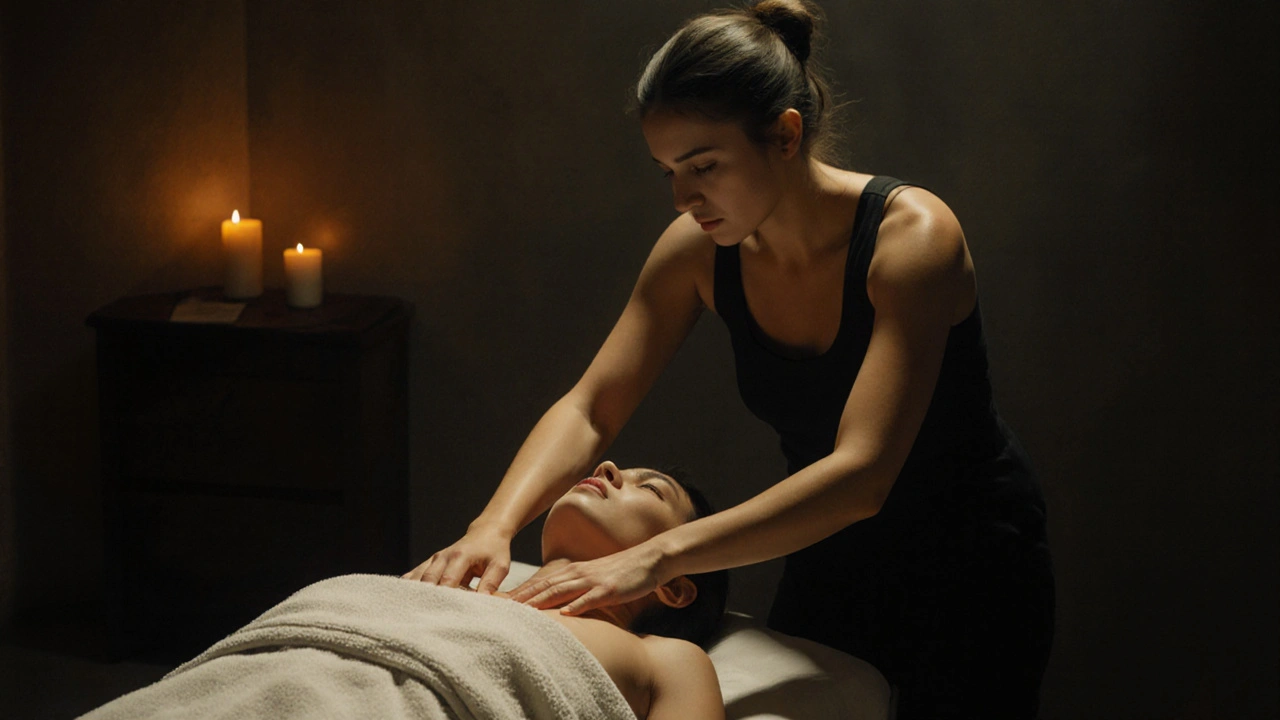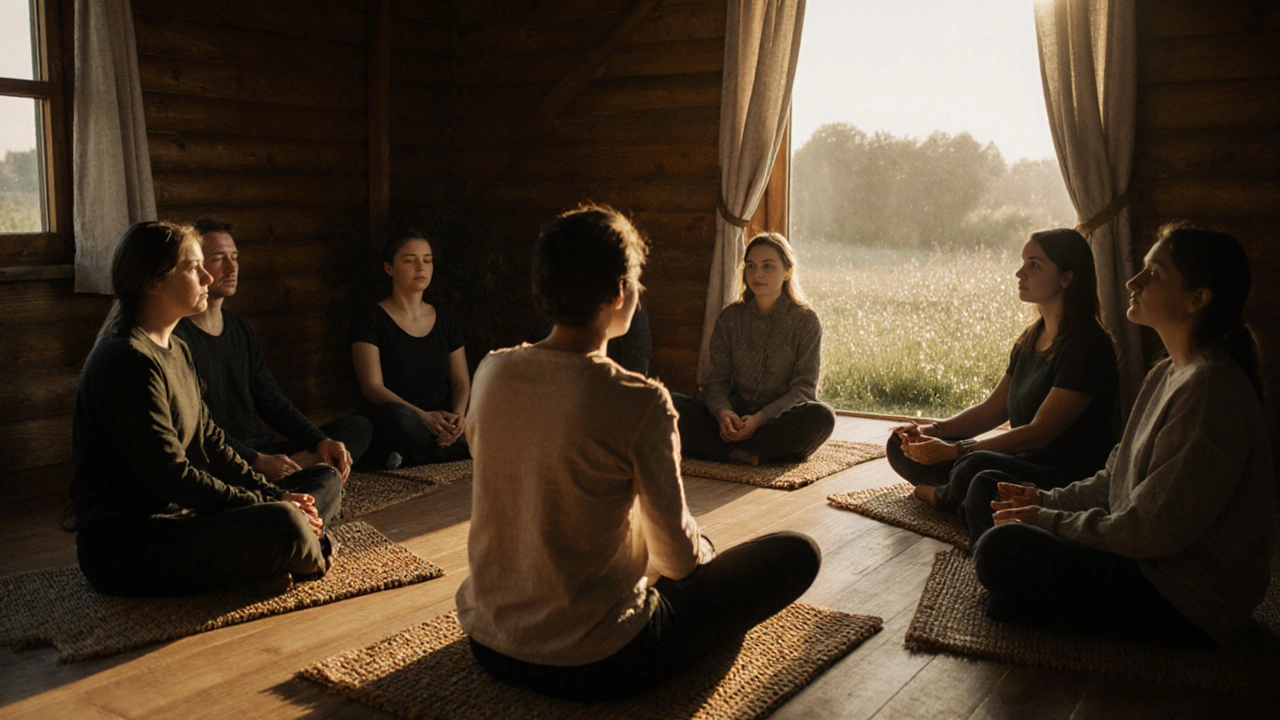What if a massage course didn’t just teach you how to touch someone-but changed how you touch yourself? That’s the promise behind CORE TOUCH I: School of Holistic Sensual Massage. It’s not a typical spa certification. It’s a 10-day immersive experience in the Czech Republic that blends bodywork, emotional vulnerability, and deep personal transformation. And it’s one of the most talked-about programs in Europe for people seeking more than just relaxation.
What Is CORE TOUCH Really About?
CORE TOUCH I was founded in 2002 by Denisa Říha Palečková, a Czech bodyworker and educator. Unlike traditional massage schools that focus on pressure points and strokes, CORE TOUCH is built around the idea that touch is a language. Not just for pleasure-but for connection, healing, and self-discovery. The program doesn’t teach you how to give a “good” massage. It teaches you how to be present with touch. How to feel your own boundaries. How to receive without shame. How to give without expectation. The core philosophy is simple: when you learn to be fully with your body, you naturally become more present in every relationship. It’s often labeled as “tantric massage,” but that’s misleading. There’s no chanting, no candlelit rituals, no spiritual jargon. Instead, you work with polarities-masculine and feminine energy as they live in the body-not as gender roles. You explore how tension, trauma, and pleasure are stored in muscle, breath, and silence.How the 10-Day Program Actually Works
The course runs at Váňův statek, a quiet retreat center in the Czech countryside. Participants arrive alone or as couples. No prior experience is needed. The first day starts with a group circle: no names, no stories, just sitting together in silence. That’s intentional. The goal is to strip away social masks before the bodywork even begins. Each day follows a rhythm: morning meditation, guided body awareness exercises, then paired sessions of giving and receiving sensual massage. These aren’t sexual. They’re slow. Intentional. Sometimes awkward. Always consensual. You learn to notice micro-reactions-the way someone tenses when you brush their inner thigh, or how they breathe when you hold their shoulder. One of the most powerful tools is the “active receiving” practice. You lie still while someone touches you-with no instruction, no feedback, no thank you. Just presence. For many, this is the hardest part. It forces you to face discomfort without fixing it. To sit with shame, embarrassment, or numbness-and not run. By day five, most people report feeling emotionally raw. By day eight, something shifts. People start laughing more. Hugging without reason. Saying “I feel safe here” out loud. The group dynamic becomes its own kind of therapy.Who Is This For? And Who Should Skip It?
This isn’t for people looking to become professional massage therapists. If you want to learn effleurage, petrissage, or how to use oils properly, go to a Thai massage school. CORE TOUCH doesn’t train you for a job. It trains you for life. It’s ideal for:- People in long-term relationships who feel emotionally disconnected
- Those who struggle with body image or sexual shame
- Anyone who feels numb, tired of “self-care” that’s just bubble baths and podcasts
- Men who were taught to suppress emotion and now want to reconnect with their bodies
- People seeking quick fixes or spiritual enlightenment
- Those uncomfortable with nudity or physical closeness
- Anyone who expects a “technique” to fix their relationship

Price, Logistics, and What You Actually Get
The course costs 28,880 CZK (about €1,150) plus accommodation and meals (another 12,780 CZK). That’s steep. For comparison, a standard 5-day Thai massage course in Prague runs around 15,000-20,000 CZK. So why pay nearly double? You’re not paying for techniques. You’re paying for:- A 120-page manual with detailed body maps and emotional cues
- 8 hours of online video content to revisit after the course
- 6 months of free monthly group supervision
- Access to a private Facebook group with over 1,200 graduates
- One-on-one coaching at 1,500 CZK/hour if you need extra support
What Graduates Say-And What They Don’t
Based on 37 public reviews and 12 video testimonials, the most common feedback is this: “I didn’t know I was disconnected from my body until I felt it again.” Tereza Mušková, a 39-year-old teacher from Prague, wrote: “I learned to feel my own skin. Not as something to be fixed, but as something to be loved. I stopped apologizing for wanting touch.” But it’s not all glowing. About 15% of participants say it was too intense. One man posted on Facebook: “I left halfway. The silence felt like pressure. I wasn’t ready.” Another said, “I felt exposed, not healed.” Critics-including some therapists-worry about the lack of verbal communication during certain exercises. Psychologist Petr Svoboda called it “borderline unethical” in a 2021 conference. Denisa responded: “Every touch is negotiated. We don’t assume consent. We ask. We pause. We check in.” Independent research by ResearchPro found that 89% of participants rated the course as “very or extremely useful” for their personal lives. Two-thirds said it improved their romantic relationships. That’s rare in the wellness space.How It Compares to Other Programs
The Czech market for sensual bodywork is growing fast. CORE TOUCH holds about 35% of the market share-far ahead of competitors like Tantra Massage Academy (25%) and Body Wisdom School (18%). Here’s how they stack up:| Feature | CORE TOUCH I | Tantra Massage Academy | Thai Massage School |
|---|---|---|---|
| Duration | 10 days | 7 days | 5 days |
| Focus | Emotional transformation | Spiritual energy | Technique and pressure |
| Price (CZK) | 28,880 + accommodation | 22,000 + accommodation | 15,000-20,000 |
| Aftercare | 6 months free supervision | 1 month online support | None |
| Gender Split | 68% women, 32% men | 82% women | 75% women |
| Best For | Deep personal change | Energy work enthusiasts | Professionals seeking certification |

The Hidden Cost: Emotional Labor
The biggest price tag isn’t the 28,880 CZK. It’s the emotional labor you’ll do after you leave. Most people don’t realize how hard it is to return to daily life after 10 days of deep presence. You come back to a world that doesn’t talk about touch, vulnerability, or silence. You might feel lonely. Confused. Overwhelmed. That’s why the free supervision for six months matters. It’s not just a perk-it’s a lifeline. Many graduates say they wouldn’t have kept practicing without those monthly check-ins.What’s Next? CORE TOUCH II
A new version, CORE TOUCH II, is set to launch in late 2024. It’s designed for those who’ve completed the first course and want to go deeper. There’s talk of a professional track for therapists, coaches, and healers who want to integrate these practices into their work. But Denisa is clear: this isn’t becoming a franchise. No online courses. No “quick start” versions. She wants to keep it small, slow, and human.Final Thoughts: Is It Worth It?
If you’re looking for a massage technique to add to your resume, walk away. But if you’ve ever felt:- Alone in a relationship
- Disconnected from your body
- Like touch was something you had to earn
- Like you’re tired of pretending you’re okay
Is CORE TOUCH a tantric massage course?
No, not in the traditional sense. While it’s often called tantric, CORE TOUCH avoids spiritual rituals, mantras, or chakra work. It focuses on embodied presence, emotional safety, and non-sexual touch as a path to self-awareness. The term is used loosely by the media, but the program itself is grounded in body psychology, not mysticism.
Do I need to be in a relationship to join?
No. The program welcomes individuals and couples equally. Many participants come alone. The exercises are designed so you work with different partners in the group, always with consent and clear boundaries. Being single doesn’t disqualify you-it might even help you focus on your own relationship with touch.
Is nudity required?
Yes, but only during massage sessions, and only if you’re comfortable. You’ll be draped with towels at all times. The environment is non-sexual and strictly consensual. No one is pressured. You can choose to keep underwear on or wear a robe during certain exercises. The focus is on skin-to-skin awareness, not exposure.
Can men benefit from this course?
Absolutely. While 68% of participants are women, the male participation rate has grown 22% in the last two years. Many men enter the course feeling emotionally shut down or confused about intimacy. The program helps them reconnect with vulnerability without shame. Denisa runs specific sessions for men that address societal pressures around masculinity and touch.
Is there any certification after completing the course?
No. CORE TOUCH does not issue certificates, licenses, or professional titles. The goal isn’t to create massage therapists-it’s to help people become more present in their own lives. If you want certification, you’ll need to look elsewhere. But many therapists and coaches later integrate CORE TOUCH principles into their work without formal credentials.
What happens after the 10 days?
You get six months of free monthly group supervision calls with other graduates. There’s also a private Facebook group with over 1,200 members where people share experiences, ask questions, and organize local meetups. You can also book paid one-on-one sessions with the instructors at 1,500 CZK per hour. The community doesn’t disappear when the course ends-it becomes your support system.
Are there any risks or ethical concerns?
Some therapists have raised concerns about exercises involving silent touch without verbal feedback. Denisa responds that all touch is negotiated in advance, boundaries are checked hourly, and participants can stop at any time. The program has adjusted its methods in the past after regulatory feedback from Czech health authorities. There’s no evidence of abuse, but emotional intensity is real-participants are advised to have support systems in place after returning home.
Can I do this if I have trauma or mental health issues?
It’s not a therapy program, but many people with trauma find it healing. That said, you must complete a 45-minute pre-course consultation with the instructors. They’ll ask about your history and help you decide if this is the right time. If they feel you need more support, they’ll recommend working with a therapist first. Safety is prioritized over participation.






